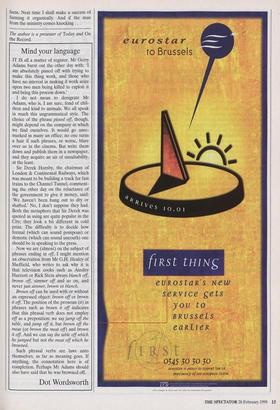Mind your language
IT IS all a matter of register. Mr Gerry Adams burst out the other day with: 'I am absolutely pissed off with trying to make this thing work, and those who have no interest in making it work seize upon two men being killed to exploit it and bring this process down.'
I do not mean to denigrate Mr Adams, who is, I am sure, fond of chil- dren and kind to animals. We all speak in much this ungrammatical style. The choice of the phrase pissed off, though, might depend on the company in which we find ourselves. It would go unre- marked in many an office; no one turns a hair if such phrases, or worse, blare over us in the cinema. But write them down and publish them in a newspaper, and they acquire an air of unsuitability, at the least.
Sir Derek Hornby, the chairman of London & Continental Railways, which was meant to be building a track for fast trains to the Channel Tunnel, comment- ing the other day on the reluctance of the government to give it money, said: `We haven't been hung out to dry or shafted.' No, I don't suppose they had. Both the metaphors that Sir Derek was quoted as using are quite popular in the City; they look a bit different in cold print. The difficulty is to decide how formal (which can sound pompous) or demotic (which can sound uncouth) one should be in speaking to the press.
Now we are (almost) on the subject of phrases ending in off, I might mention an observation from Mr G.H. Healey of Sheffield, who writes to ask why it is that television cooks such as Ainsley Harriott or Rick Stein always blanch off, brown off, simmer off and so on, and never just simmer, brown or blanch.
Brown off can be used with or without an expressed object: brown off or brown it off. The position of the pronoun (it) in phrases such as brown it off indicates that this phrasal verb does not employ off as a preposition: we say jump off the table, and jump off it, but brown off the meat (or brown the meat off) and brown it off. Arid we can say the table off which he jumped but not the meat off which he browned.
Such phrasal verbs are laws unto themselves, as far as meaning goes. If anything, the connotation here is of completion. Perhaps Mr Adams should also have said that he was browned off.
Dot Wordsworth


























































 Previous page
Previous page